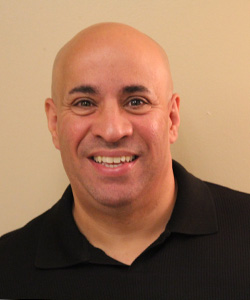
Lives of Consequence
David Hernandez '81

As the senior director of Campus Operations at Haven for Hope of Bexar County, David Hernandez ’81 works to “ensure we are doing all we can to serve those in need, helping them find a path towards recovery.”
Haven for Hope, located in San Antonio, Texas, defines itself as “a place of hope and new beginnings for people in Bexar County experiencing homelessness.” People who are experiencing homelessness can be referred to Haven for Hope from community agencies such as law enforcement, businesses and medical providers. It offers two programs to combat homelessness: the Courtyard, a safe sleeping program that can accommodate 500 individuals, and the Transformational Campus, which can house up to 1,000 men, women and children ready to recover from homelessness.
“Many of those experiencing homelessness are people just like you and me whose traumatic life experiences led to a myriad of challenges resulting in homelessness,” says Hernandez. “Whether their problems stem from financial, physical, mental, emotional and/or spiritual challenges, they are people who simply need others to love and care for them.”
Hernandez doesn’t talk about people being homeless; rather, he believes people experience homelessness. This distinction is reflective of Haven for Hope’s recovery-oriented system of care (ROSC), the goal of which is to end the cycle of homelessness by addressing its root causes: job loss, abuse, rape, mental illness and other trauma. To this end, Haven for Hope provides counseling, medication, education, employment services and legal services with its 35 partner agencies, located right on campus.
“Recovery-oriented systems of care utilize a coordinated network of community-based services and programs to care for those experiencing homelessness,” explains Hernandez. This structure differs from other types of homeless shelters because ROSC recognizes “the individual’s strengths and capacity for making positive choices.” It’s effective because it gives clients opportunities for self-direction and responsibility, delivers individualized, person-centered services, fosters a sense of empowerment using a strengths-based approach, understands that care requires holistic, non-linear strategies and utilizes a peer support system.
“Homelessness is a symptom of a much greater challenge,” continues Hernandez. “Whatever the trauma, housing someone without addressing their trauma will only result in their re-experiencing homelessness.”
Hernandez, who majored in sociology at the Colleges and holds a master’s degree in public administration, sees his career as an opportunity to give back to others.
Before joining Haven for Hope, Hernandez served for more than 20 years in the Rochester, N.Y. Police Department, holding various positions throughout his tenure before retiring as the Captain of the Special Investigations Section. He was responsible for all confidential investigations related to guns, drugs and violence.
While living in Rochester, Hernandez worked with the Rochester Youth Association, an organization devoted to catalyzing fellowship among ethnically and denominationally diverse church youth in the Greater Rochester Area. Hernandez was instrumental in organizing mission trips to churches in Ecuador and Colombia, while raising donations for computers, instruments and clothing for the churches in need.
“My career in law enforcement challenged me and taught me a great deal about leadership, both the good and bad,” reflects Hernandez. “Having experienced working abroad in the mission fields in South America, Haven for Hope presented the opportunity to minister to the lives of those suffering here in the United States.”
Hernandez, who also serves as a reserve deputy in Bexar County, completed his doctoral degree in educational leadership at the University of Texas-San Antonio in 2017, with a dissertation titled "Perceptions of Male Urban Students of Color: Police, Policing, and the Impact on Their Educational Experiences."
